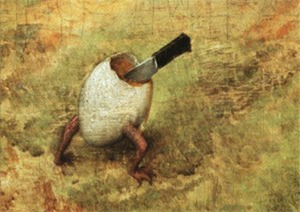11289359
Ethics in Business
Descripción
Diapositivas por Gillian Hall, actualizado hace más de 1 año
Más
Menos

|
Creado por Gillian Hall
hace alrededor de 7 años
|
|
Resumen del Recurso
Diapositiva 1
KANTIAN ETHICS
Goodwill and Categorical Imperative
-humans are required to do their duties
- not arbitrary
-to determine if something is moral, universalize it
- if the entire world followed this rule, what would it be like? What if we universalized murder or stealing?
- if you can universalize it, then it's a moral duty
-No special pleading
-Veil of Ignorance
- you must hide identities in a situation in order to remove personal bias
-no special treatment or discrimination
- HUMAN SHOULD NOT BE TREATED AS A MEANS TO AN END
- humans=dignity
- objects= value
-humans should not be sacrificed for the greater good
-humans must not commit suicide
-motive=important
- actions should be motivated by reason, not emotion
-actions must be held to the maxim, or global standard
- if moral humans aren't rewarded in life, then they must be rewarded in the afterlife
-God=real
-Goodwill: acting out of goodwill is to fulfill your obligations
-Categorical Imperative: a reason to do something whether you like it or not (you may not want to do something, but it's your duty
- What is the difference between moral and nonmoral actions?
- nonmoral: acting out of inclination
-moral: acting out of duty
Diapositiva 2
CARR'S ETHICS & THE MYSTERIOUS DR. B
Theory: Ethics in business is defined by the rules of the business world, not moral world
-Poker example (play the game)
Flaws:
- switches back and forth on ideas
- assumes everyone knows the rules of the game
- business is ethical if it follows the law (not true)
1984: businessman Rolf Kiefer able to tell the "technology park" is shady and they offered too much money in cash
1985: companies IBI and Imhausen Chemie agree to supply materials to Libya
1985-89: Barbouti sends supplies through Hong Kong and Frankfurt
-Claims he didn't know they were producing weapons at Pharma 150 (though he bought chemical and machinery, and was the supervisor)
-TECHNICALLY didn't break any laws
-didn't want to lie nor tell the truth
Diapositiva 3
THE MADOFF AFFAIR
THE PROBLEM: Madoff was running a Ponzi scheme
TIMELINE
1960: went into business; worked with father in law, stock trading
-lost money, paid off with own money
70s/80s: Ponzi scheme begins; works with Avellino & Bienes
1990: partner with Fairfield Greenwich (run by Walter Noel and Jeffrey Tucker)
2000: Markopolos (whistleblower) gives memos to SEC 3x
2001: Fairfield Greenwich suspicious, asks about money; Madoff vaguely replies, but doesn't provide real answer
2008: confesses to son, goes public
2009: plead guilty, 150 years in prison
-OTHER INFO:
-Fairfield Greenwich: feeder fund
-didn't take client fees, got extra money
-secrecy rule (no mention of name, felt exclusive)
-Noel's daughters: married wealthy foreigners
-affinity con: connected with people on similarities, hooked them up with deals
DISCREPANCIES AND THE REVEAL:
-returns were too good (10-20% all the time)
-listed investments with companies that weren't taking investors
-only sent hard copies of statements through mail
-17th floor: restricted (suspicious)
Diapositiva 4
Madoff cont.
Due Diligence:
-SEC allegations prompted Tucker to visit Madoff
-gave him cursory glance at records
-Fairfield Greenwich Due Diligence was in Bermuda, couldn't regulate control
SEC/WALL STREET:
- possibly paid off, scared to investigate, lazy
FINAL STRAW:
-2008 housing crisis:
- more people wanted to cash out than invest
- tried to offer exclusive investment opportunities
-couldn't pay investors
-scheme revealed
¿Quieres crear tus propias Diapositivas gratis con GoConqr? Más información.
